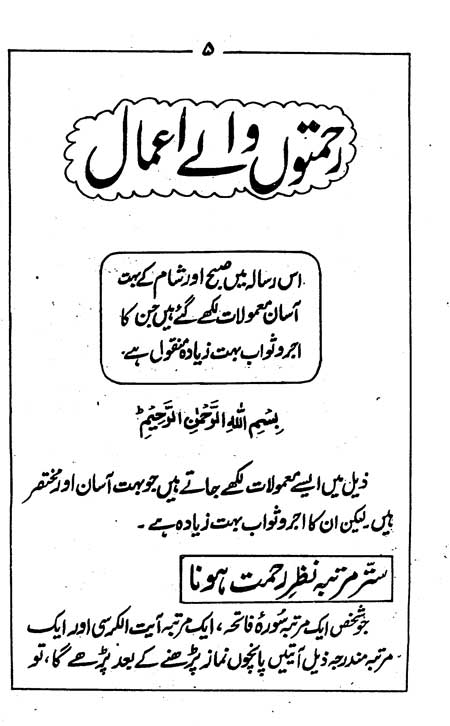
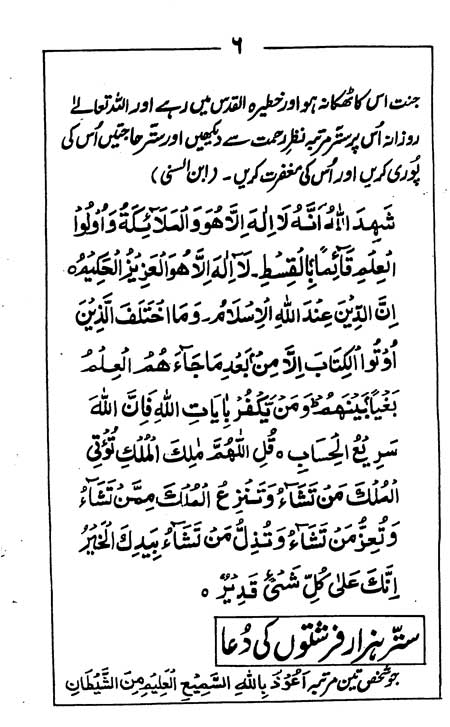
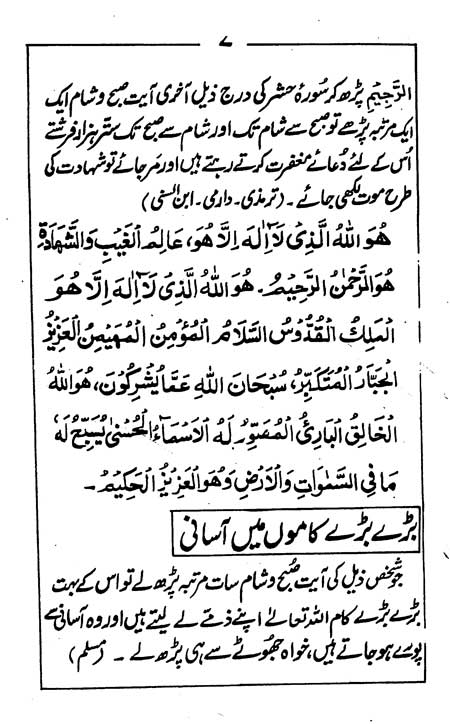
Treatment Of Wives
In light of the Verses of the Qur’an, we see that Allah, the Exalted, ordered excellent treatment towards the wife, generosity towards her, and the best cohabitation with her, even if there is no love from the heart. Allah, the All-Wise said: “And live with them in the best way. If you dislike them, it may be that you dislike a thing and Allah brings through it a great deal of good.” (Surah An-Nisa’, 4:19)
The Prophet (Peace be upon him) said:
“A believer man must not hate (his wife) believing woman; if he dislikes one of her characteristics he will be pleased with another.” (Reported by Muslim)
Also, Allah clarifies that the woman has rights toward her husband, just as the husband has towards her. Allah, the Exalted says:
“And they (women) have rights (over their husbands), similar (to those of their husbands) over them, to what is reasonable.” (Surah Al-Baqarah, 2:228)
And the Prophet’s (Peace be upon him) last will before he dies was that men should take care of their wives and honor them, and never treat them unfairly or swallow their rights. The Prophet (Peace be upon him) said:
“Treat the women in the best way.”
And the Prophet (Peace be upon him) ordered us to behave well to our wives, and be generous with them, and he also clarified that the best of men is he who treats his wife best. The Prophet (Peace be upon him) said:
“The most complete in faith is the best in character. And the best of you is the one who is best to his wife.” (Reported by At-Tirmidhi)
The Prophet (Peace be upon him) also said:
“The best of you is the one who is best to his wife, and I am the best of you to my wives.” (Reported by Ibn Majah)
Also, the Prophet (Peace be upon him) ordered his Companions to endure the mistakes of their women, clarifying the nature of the woman, in which Allah created her. The Prophet (Peace be upon him) said:
“Treat the women in the best way. Verily, the woman was created from a rib and the most crooked portion of the rib is its upper part; if you try to straighten it, it will break, and if you leave it, it will remain crooked, so treat the women in the best way.” (Reported by Al-Bukhari)
The Messenger of Allah (Peace be upon him) also said:
“Verily, the woman was created from a rib. It shall not be straightened to you in any way (i.e. she shall not behave exactly as you wish her to). Thus, if you enjoy her, you will enjoy her bent. And if you tried to straighten her, you would break her. And to break her means a divorce.” (Reported by Mustakhrag Abi ‘Awana)
- February, 23
- 4126
- Human Rights
- More
Subh Aur Shaam Ki Duaain Aur Masnoon Azkaar
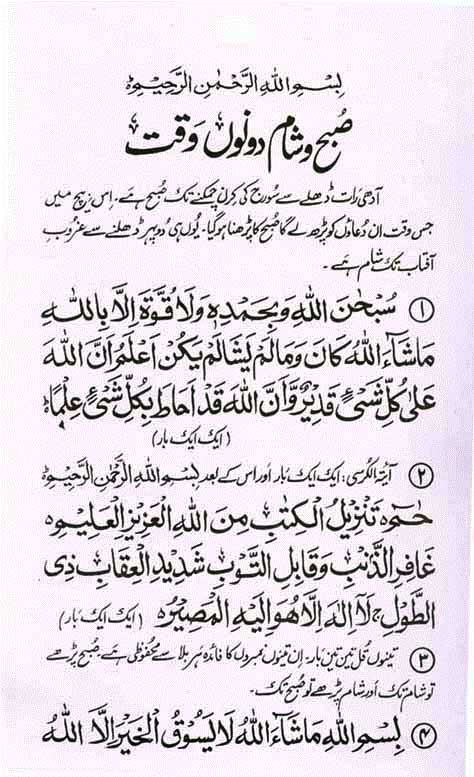
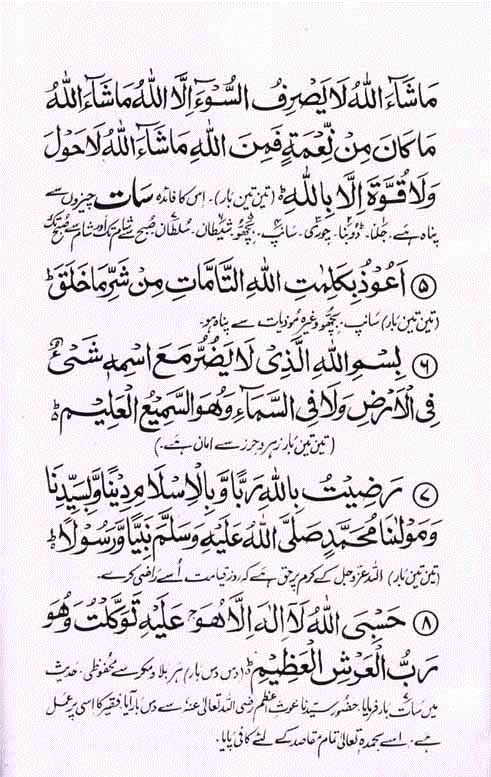
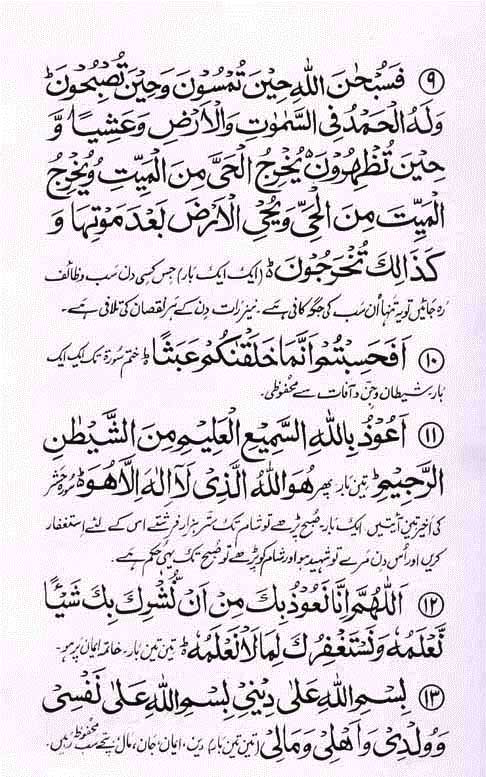
Five Pillars Of Islam
What Are the Five Pillars of Islam?
1) The Testimony of Faith
2) Prayer
3) Giving Zakat (Support of the Needy)
4) Fasting during the Month of Ramadan
5) The Pilgrimage to Makkah
The Five Pillars of Islam are the framework of Muslim life. They are the testimony of faith, prayer, giving zakat (support of the needy), fasting during the month of Ramadan, and the pilgrimage to Makkah once in a lifetime for those who are able.
1) The Testimony of Faith:
The testimony of faith is saying with conviction, “La ilaha illa Allah, Muhammadur rasoolu Allah.” This saying means “There is no true god (deity) but ALLAH, and Muhammad is the Messenger (Prophet) of ALLAH.” The first part, “There is no true god but ALLAH,” means that none has the right to be worshiped but ALLAH alone and that ALLAH has neither partner nor son. This testimony of faith is called the Shahada, a simple formula that should be said with conviction in order to convert to Islam. The testimony of faith is the most important pillar of Islam.
2) Prayer:
Muslims perform five prayers a day. Each prayer does not take more than a few minutes to perform. Prayer in Islam is a direct link between the worshiper and ALLAH. There are no intermediaries between ALLAH and the worshiper.
In prayer, a person feels inner happiness, peace, and comfort, and that ALLAH is pleased with him or her. The Prophet Muhammad (S.A.W.W) said: {Bilal, call (the people) to prayer, let us be comforted by it.} Bilal was one of Muhammad’s (S.A.W.W) companions who was charged to call the people to prayers.
Prayers are performed at dawn, noon, mid-afternoon, sunset, and night. A Muslim may pray almost anywhere, such as in fields, offices, factories, or universities.
3) Giving Zakat (Support of the Needy):
All things belong to ALLAH, and wealth is therefore held by human beings in trust. The original meaning of the word zakat is both ‘purification’ and ‘growth.’ Giving zakat means ‘giving a specified percentage on certain properties to certain classes of needy people.’ The percentage which is due on gold, silver, and cash funds that have reached the amount of about 85 grams of gold and held in possession for one lunar year is two and a half percent. Our possessions are purified by setting aside a small portion for those in need, and, like the pruning of plants, this cutting back balances and encourages new growth.
A person may also give as much as he or she pleases as voluntary alms or charity.
4) Fasting the Month of Ramadan:
Every year in the month of Ramadan, all Muslims fast from dawn until sundown, abstaining from food, drink, and sexual relations.
Although the fast is beneficial to health, it is regarded principally as a method of spiritual self-purification. By cutting oneself off from worldly comforts, even for a short time, a fasting person gains true sympathy with those who go hungry, as well as growth in his or her spiritual life.
5) The Pilgrimage to Makkah:
The annual pilgrimage (Hajj) to Makkah is an obligation once in a lifetime for those who are physically and financially able to perform it. About two million people go to Makkah each year from every corner of the globe. Although Makkah is always filled with visitors, the annual Hajj is performed in the twelfth month of the Islamic calendar. Male pilgrims wear special simple clothes which strip away distinctions of class and culture so that all stand equal before ALLAH.
Pilgrims praying at the Haram mosque in Makkah
Pilgrims praying at the Haram mosque in Makkah. In this mosque is the Kaaba (the black building in the picture) which Muslims turn toward when praying. The Kaaba is the place of worship that ALLAH commanded the Prophets Abraham and his son, Ishmael, to build.
Tawwakul Aur Shukar

Tawwakul Aur Shukar
Faith In Religion
When Ali bin Abu Talib RA was asked about Faith in Religion, he replied that the structure of faith is supported by four pillars: endurance, conviction, justice, and jihad.
Endurance is composed of four attributes: eagerness, fear, piety, and anticipation (of death). so whoever is eager for Paradise will ignore temptations; whoever fears the fire of Hell will abstain from sins; whoever practices piety will easily bear the difficulties of life and whoever anticipates death will hasten towards good deeds.
Conviction has also four aspects to guard oneself against infatuations of sin; to search for an explanation of truth through knowledge; to gain lessons from instructive things and to follow the precedent of the past people, because whoever wants to guard himself against vices and sins will have to search for the true causes of infatuation and the true ways of combating them out and to find those true ways one has to search them with the help of knowledge, whoever gets fully acquainted with various branches of knowledge will take lessons from life and whoever tries to take lessons from life is actually engaged in the study of the causes of rising and fall of previous civilizations.
Justice also has four aspects depth of understanding, the profoundness of knowledge, fairness of judgment, and dearness of mind; because whoever tries his best to under- stand a problem will have to study it, and whoever has the practice of studying the subject is to deal with, will develop a clear mind and will always come to correct decisions, whoever tries to achieve all this will have to develop ample patience and forbearance and whoever does this has done justice to the cause of religion and has led a life of good repute and fame.
Jihad is divided into four branches: to persuade people to be obedient to Allah; to prohibit them from sin and vice; to struggle (in the cause of Allah) sincerely and firmly on all occasions and to detest the vicious. Whoever persuades people to obey the orders of Allah provides strength to the believers; whoever dissuades them from vices and sins humiliates the unbelievers; whoever struggles on all occasions discharges all his obligations and whoever detests the vicious only for the sake of Allah, then Allah will take revenge on his enemies and will be pleased with Him on the Day of Judgment.
[Nahj ul Balagha]
Qurani Mustajab Dua’een
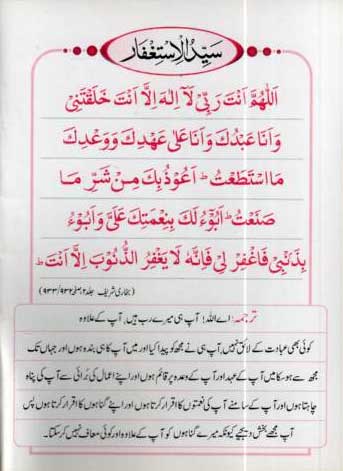
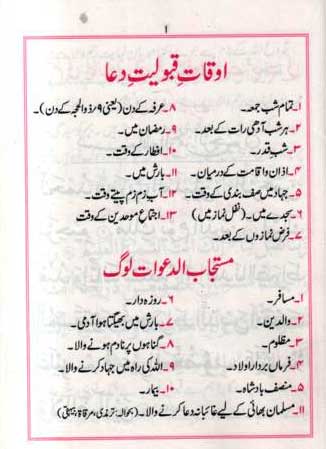
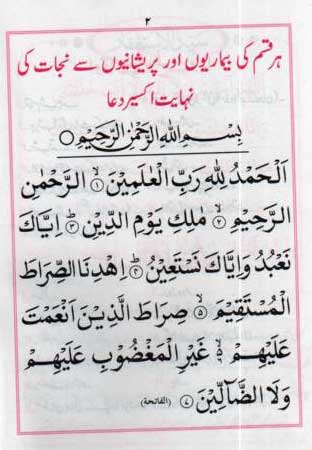
The Excellence Of Ayat-ul-Kursi
Abu Hurairah (May Allah be pleased with him) reported: The Messenger of Allah (PBUH) put me in charge of charity of Ramadan (Sadaqat-ul-Fitr). Somebody came to me and began to take away some foodstuff. I caught him and said, “I must take you to the Messenger of Allah (PBUH).” He said, “I am a needy man with a large family, and so I have a pressing need.” I let him go. When I saw the Messenger of Allah (PBUH) next morning, he asked me, “O Abu Hurairah! What did your captive do last night?” I said, “O Messenger of Allah! He complained of a pressing need and a big family. I felt pity for him so I let him go.” He (PBUH) said, “He told you a lie and he will return.” I was sure, according to the saying of the Messenger of Allah (PBUH) that he would return. I waited for him. He sneaked up again and began to steal foodstuff from the Sadaqah. I caught him and said; “I must take you to the Messenger of Allah (PBUH).” He said, “Let go of me, I am a needy man. I have to bear the expenses of a big family. I will not come back.” So I took pity on him and let him go. I went at dawn to the Messenger of Allah (PBUH) who asked me, “O Abu Hurairah! What did your captive do last night?” I replied, “O Messenger of Allah! He complained of a pressing want and the burden of a big family. I took pity on him and so I let him go.” He (PBUH) said, “He told you a lie and he will return.” (That man) came again to steal the foodstuff. I arrested him and said, “I must take you to the Messenger of Allah (PBUH), and this is the last of three times. You promised that you would not come again but you did.” He said, “Let go of me, I shall teach you some words with which Allah may benefit you.” I asked, “What are those words?” He replied, “When you go to bed, recite Ayat-ul-Kursi (2:255) for there will be a guardian appointed over you from Allah, and Satan will not be able to approach you till morning.” So I let him go. The next morning the Messenger of Allah (PBUH) asked me, “What did your prisoner do last night.” I answered, “He promised to teach me some words which he claimed will benefit me before Allah. So I let him go.” The Messenger of Allah (PBUH) asked, “What are those words that he taught you?” I said, “He told me: `When you go to bed, recite Ayat-ul-Kursi from the beginning to the end i.e.,
[ Allah! none has the right to be worshiped but He, the Ever Living, the One Who sustains and protects all that exists. Neither slumber nor sleep overtakes Him. To Him belongs whatever is in the heavens and whatever is on the earth. Who is he that can intercede with Him except with His Permission? He knows what happens to them (His creatures) in this world, and what will happen to them in the Hereafter. And they will never compass anything of His Knowledge except that which He wills. His Kursi encompasses the heavens and the earth, and preserving them does not fatigue Him. And He is the Highest, the Most Great].’ (2:255).
He added: `By reciting it, there will be a guardian appointed over you from Allah who will protect you during the night, and Satan will not be able to come near you until morning.” The Messenger of Allah (PBUH) said, “Verily, he has told you the truth though he is a liar. O Abu Hurairah! Do you know with whom you were speaking for the last three nights?” I said, “No.” He (PBUH) said, “He was Shaitan (Satan).” [Al-Bukhari].
Commentary: This Hadith tells us the excellence of Ayat-ul-Kursi and the importance of reciting it before going to bed.
Roshan Roshan
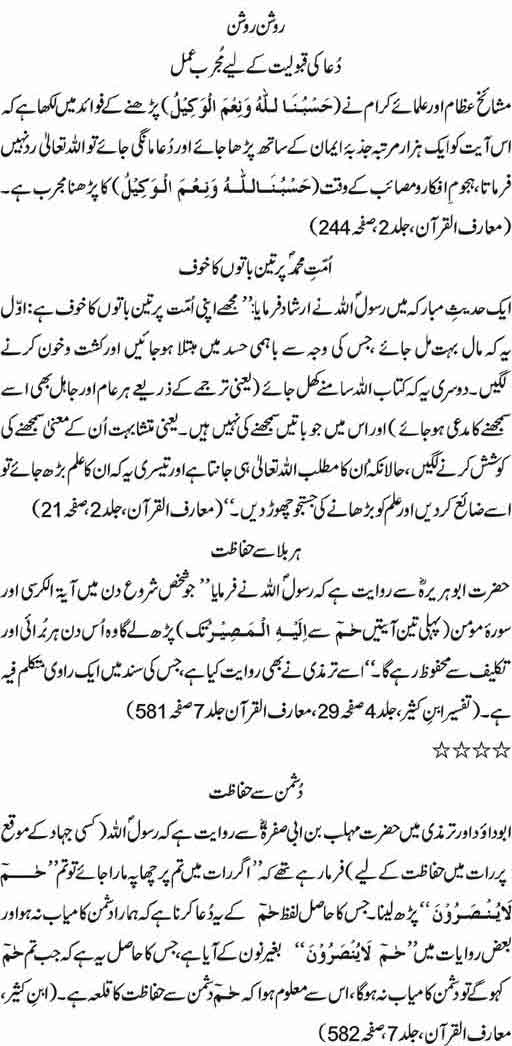
Roshan Roshan Dua Ki Qabooliyat Kay Liye Mujarab Amal
The Minor Signs Of The Last Day
Qiyamah will come when…
Hadhrat Abu Musa Ash’ari (R.A.) narrates that Rasulallah (Sallallahu Alayhi Wassallam) said, “Qiyamah will come…
When it will be regarded as a shame to act on Quranic injunctions.
When untrustworthy people will be regarded as trustworthy and the trustworthy will be regarded as untrustworthy.
When it will be hot in winter.
When the length of days is stretched, i.e. a journey of a few days is covered in a matter of hours.
When orators and lecturers lie openly.
When people dispute petty issues.
When women with children come displeased on account of them bearing offspring, barren women remain happy on account of having no responsibility for offspring.
When oppression, jealousy, and greed become the order of the day.
When people blatantly follow their passions and whims.
When lies prevail over the truth.
When violence, bloodshed, and anarchy become common.
When immorality overtakes shamelessness and is perpetrated publicly.
When legislation matters pertaining to Deen is handed over to the worst elements of the Ummat, and if people accept them and are satisfied with their findings, then such persons will not smell the fragrance of Jannat.
When the offspring become a cause of grief and anger (for their parents).
The following is part of a lengthy Hadith narrated by Hadhrat Abdullah Ibn Mas’ood (R.A.) when he inquired from Rasulallah (Sallallahu Alayhi Wassallam) about the Signs of Qiyamah.
Music and musical instruments will be found in every home.
People will indulge in homosexuality.
There will be an abundance of illegitimate children.
There will be an abundance of critics, tale carriers, back-biters, and taunters in society.
People will establish ties with strangers and sever relations with their near and dear ones.
Hypocrites will be in control of the affairs of the community and evil, immoral people will be at the helm of business establishments.
The Masjid will be decorated, but the hearts of the people will be devoid of guidance.
The courtyards of Masjids will be built beautifully and high mimbars (pulpits) will be erected.
Gangsters and evil people will prevail.
Various wines will be consumed excessively.
Auf bin Malik (R.A.) says: I came to Rasulullah (Sallallahu Alayhi Wasallam) while he was in his skin tent during the Tabuk expedition. He said to me, “Count six things before the advent of Qiyamah:
1 My death
2 The conquest of Jerusalem
3 Mass deaths amongst you people, just as when sheep die in large numbers during an epidemic
4 Abundance of wealth to such an extent that if a person were to be given a hundred Dinars he will still not be satisfied
5 General anarchy and bloodshed, that no Arab household will be spared from it
6 Then a life of peace as a result of a peace agreement between you and the Banil Asfaar
(Romans) which they will break and attack you with a force consisting of eighty flags and under each flag will be an army of twelve thousand men.” (Hadith: Sahih Bukhari).
IRAQ and SYRIA
Abu Nadhrah says: “We were sitting in the company of Jabir bin Abdullah (R.A.) when he said: ‘Soon the people of IRAQ will neither receive any food (grain) nor any money.'” We asked, “Why would such a thing happen?” He replied, “Because of the non-Arabs.” (i.e they will prevent food from going into Iraq, in the form of “sanctions” to this day.) He then said: “Soon the people of Shaam (SYRIA) will neither receive any money nor grain.” We asked why this would happen. He replied: “Because of the Romans (christians).”
CONCEITED PEOPLE:
Hadhrat Abbas (R.A) narrates that Rasulallah (Sallallahu Alayhi Wassallam) has said, “Islam will spread far and wide, across the seas. Horses will cross the land and seas in the cause of Jihaad. Then a time will come wherein a group of people will emerge which recites the Quraan. They will claim,
‘We have recited the Quraan and is there anyone who understands the Quraan better than us? There is NO ONE more proficient than us in the study of the Quraan.’
Then Rasulallah (Sallallahu Alayhi Wassallam) asked the Sahaba, “Do you see any good in their claims?” The Sahaba replied, “No”. Rasulallah (Sallallahu Alayhi Wassallam) said, “But these conceited claimants will be from my Ummah and will be the fuel of the Fire.”
from “Signs of Qiyamah” (excerpts)
by Mohammed Ali Ibn Zubair Ali

